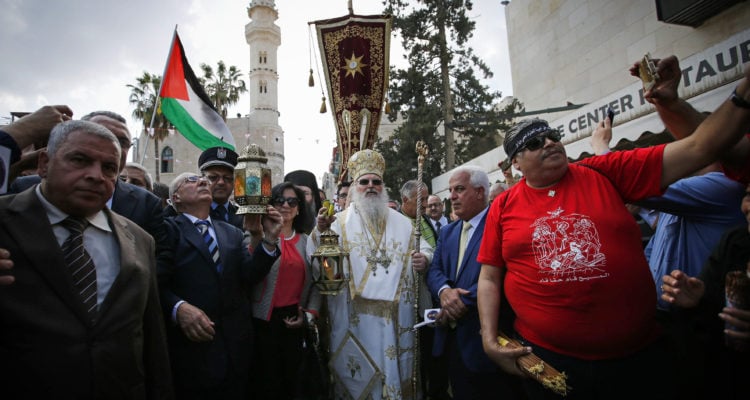The latest incident was part of a pattern, largely unreported, of the PA persecuting Christians.
By Gidon Ben-Zvi, HonestReporting
As the holidays of Passover, Ramadan and Easter converged, Israel’s need to strike a delicate balance between facilitating the access by members of numerous religious denominations to their respective holy sites and keeping Jerusalem, in particular, secure amid a Palestinian terror wave, has been covered widely.
Yet as tens of thousands of primarily Jewish, Muslim and Christian worshippers flocked to the Old City — almost uniformly depicted by the media as residing at the heart of the Israeli-Palestinian conflict and a frequent flashpoint for violence — the story of a Palestinian evangelical pastor who was jailed for 40 days after being arrested for meeting with a Jewish former member of Israel’s parliament has generated not so much as a peep from international news outlets.
And this latest incident was part of a pattern, largely unreported, of the Palestinian Authority (PA) persecuting Christians.
Local media reported that Palestinian security forces had released Pastor Johnny Shahwan from prison. Shahwan was detained on March 2 and his Christian community center — Beit Al-Liqa in Beit Jala — was shut down following a purported meeting with former Israeli parliamentarian Yehudah Glick. The Palestinian leadership “accused Shahwan of promoting normalization with the ‘Zionist entity’ and welcoming an ‘extremist Zionist settler.’”
Glick is known for his activism calling for Jews to be permitted to freely ascend the Temple Mount, upon which sits the Al-Aqsa Mosque. Israeli law forbids Jews from praying atop the Temple Mount over a fear of upsetting the “status quo” that has existed in Jerusalem since the aftermath of the 1967 Six-Day War.
Beit Jala is located just outside of Bethlehem, where, according to scripture, Christianity effectively began. The PA has for years made life virtually unlivable for Christians under its jurisdiction. In addition to Ramallah-sanctioned discrimination, Christians living under PA rule have faced attacks by Palestinian gangs. For instance, on January 28th, a large group of Palestinian masked men assaulted a Christian family just south of Bethlehem with sticks and iron bars.
Since the PA took control of the city in 1995, life in Bethlehem has been increasingly marked by land theft with little to no legal recourse; harassment of Christian women; businesses owned by Christians being forced to pay protection money; discrimination against Christians with regard to job opportunities; churches being looted and vandalized; and forced conversions.
The result has been mass emigration. In 1947, Christians comprised about 85% of Bethlehem’s population, a figure that has plunged to approximately 16%.
Persecuted in PA Territories, Thriving in Israel
The Western media’s silence about Christianity’s decline in the PA is in striking contrast to the growth, prosperity, and increasing integration of the Christian community in Israel.
While Israel does not have a formal constitution, the Knesset — the legislature — has over the years passed Basic Laws that protect freedom of religious affiliation and practice in the country.
This, as the Ministry of Education funds the public school system, including both secular and religious schools — Jewish, Muslim and Christian — in addition to some colleges and religious seminaries.
Even so, Israel’s largest religious communities — Jewish, Muslim, Christian, Druze — have jurisdiction over their internal affairs, religious affairs and personal status, including marriage, divorce and burial. All religious family courts are recognized as autonomous and paid for by the Israeli government.
And as home to some of the holiest sites in Christianity, Israel officially recognizes 10 Christian denominations for the purposes of personal status such as marriage and divorce: Greek Orthodox, Greek Catholic, Roman Catholic, Armenian Orthodox, Armenian Catholic, Maronite, Syrian Orthodox, Syrian Catholic, Chaldean Catholic and (Anglican) Episcopal.
As a result, Israel is the only country in the Middle East in which the native Christian population has increased since 1948. By the end of 2019, Israel’s Christian population stood at 177,000, according to the Central Bureau of Statistics.
In Jerusalem, the Arab population stands at approximately 341,500, compared to 536,600 Jews who live in the holy city. In 1948, a mere 65,000 Muslim and Christian Arabs resided in Jerusalem.
Case of Selective Reporting
The arrest of Pastor Johnny Shahwan by a Palestinian Authority with an atrocious human rights record seemingly held no interest for the world’s leading news outlets. Yet the international media have in the past found the story of a religious figure being held captive by an autocratic government to be quite newsworthy.
The ordeal of American pastor Andrew Brunson, who was released after being detained in Turkey for two years, is a case in point. Brunson had been charged with helping to plot a coup to topple Turkish President Recep Tayyip Erdoğan. His plight generated global headlines.
Israel and the Palestinian Authority have very different policies on Jerusalem. On the one hand, Israeli law mandates that everyone, regardless of religious affiliation, has the right to visit all holy places. Exceptions have only been made during religious holy days and after terrorist attacks, when the government has been forced to impose restrictions because of security threats.
On the other hand, Palestinian Authority Chairman Mahmoud Abbas has used the Old City’s religious centrality to incite against the Jewish state. In March, he even called on Christians to join the fight against Israel in a meeting in Ramallah with Patriarch Theophilos III of Jerusalem.
But such facts, along with the story of Pastor Shahwan, belie the Palestinian victimhood narrative that frames the majority of stories about the conflict between Jerusalem and Ramallah, and are thus conveniently ignored.
